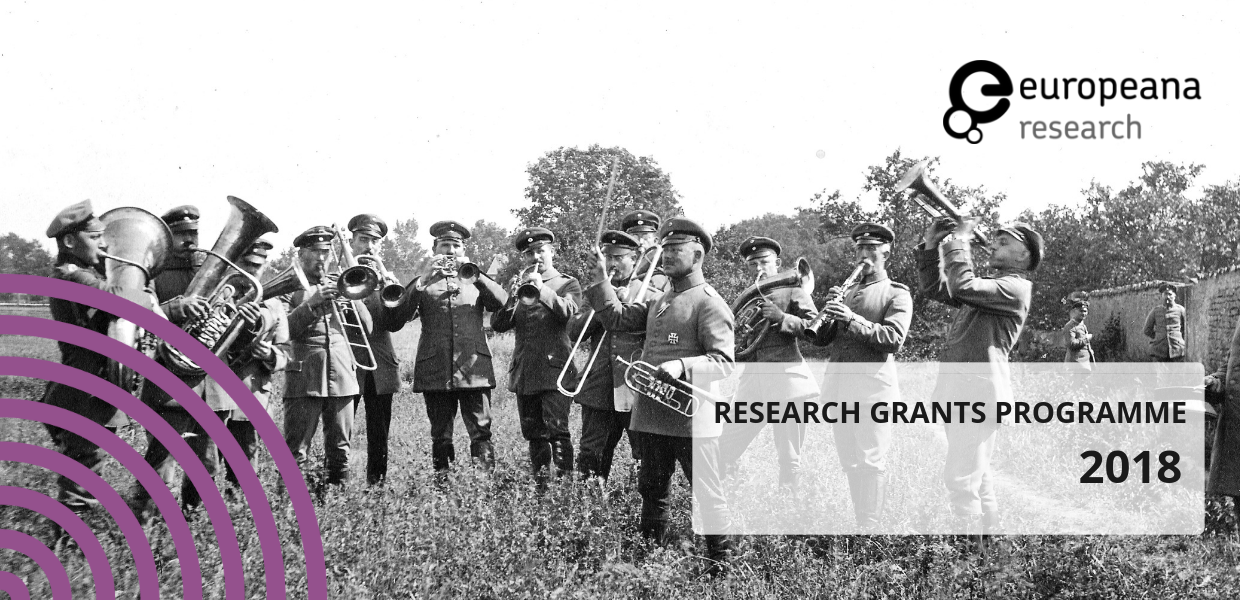Europeana Research Grants Programme: 2018 Call for Submissions
Update November 19 2018:
The Europeana Foundation is delighted to announce the project proposals that will be funded in 2019:
- Dr Berber Hagedoorn, 'Europeana 1914-1918: AV Storytelling Data in a European Comparative Perspective';
- Dr Saverio Vita, 'Upgrading History. Diaries from the War Front';
- Dr Elizabeth Benjamin, 'Return to Sender: Mapping Memory Journeys in the Europeana 1914-1918 Postcard Archive'.
Update October 3 2018:
The deadline has been extended until 15 October 2018 23:59 CET
Explore the Europeana 1914-18 collection, submit your project proposal by 15th October and potentially receive up to €8,000 for your research project.
We invite you to explore the Europeana 1914-1918 Collection and to submit projects that are transnational in scope. The collection hosts 400,000 items aggregated from Europeana partner libraries, archives and museums, including over 600 hours of video, alongside 200,000 items of content contributed by individuals both online and during the 200+ collection days. The community collection days, organised by Europeana and other institutions throughout Europe, invited people to share their stories and objects from the First World War, which were then digitised by professional archivists. Applicants are also invited to explore the selection of newspapers from the First World War period in the Europeana platform, which offers over 20,000 openly licensed records.
Resources
- Europeana 1914-1918 thematic collection
- Most relevant queries regarding historical sources: Newspapers, Photographs Collections, Maps, World War I Films, Women in World War I.
- Guidance on searching Europeana Collections
- Europeana APIs and technical support via the API forum
- Europeana Blog
Eligibility
The Research Grants Programme is intended for early career scholars of all nationalities and in any field of the humanities. They must have a particular interest in cultural heritage and take a digital humanities approach. Applicants must hold a PhD, with no more than seven years of experience after the completion of their PhD. With duly justified exceptions, their projects must be hosted by institutions, e.g. a university, a research centre, a library lab or a museum, working in one of the European Union Member States.
This is a condition of the funding from the European Commission within the Connecting Europe Facility (CEF) programme (cfr Regulation (EU) No 1316/2013 of the European Parliament and of the Council of 11 December 2013 establishing the Connecting Europe Facility, Chapter III, Article 8: 'Only expenditure incurred in Member States may be eligible, except where the project of common interest involves the territory of one or more third countries and where the action is indispensable to the achievement of the objectives of the project concerned').
The eligible projects must:
- Focus on the First World War theme.
- Use openly licensed Europeana content, including but not limited to the Europeana 1914-1918 Collection.
- Apply digital tools and digital humanities methods to address their specific research topic.
Important: Projects based at institutions that are Europeana DSI-4 project partners are NOT eligible for this call. Check the list before applying.
Application guidelines
Applications must be in English and submitted by 15 October 2018, 23:59 CET (please, find the link at the bottom).
Applicants will be asked to provide their contact information plus five keywords and an abstract of their project (max. 300 words). The CV and the project proposal (max. 1500 words) must be uploaded in PDF format. The project proposal must describe the state of play, topic, methodology and (digital) tools used, expected results, a timeline, the allocation of funding, and a dissemination plan. Max. five annexes for tables / images / bibliography and webliography are allowed in the file.
Make sure you read our frequently asked questions before submitting your proposal.
Important: We reserve the right to withhold a grant if false information is provided in the application form.
The Europeana Foundation will process applicants' data according to its privacy policy. If you have a complaint concerning the processing of your personal data, please contact us via info@europeana.eu.
Assessment and decision-making
The assessment and decision-making process consists of an initial screening against the eligibility criteria, a selection of shortlisted projects and a round of interviews. The Europeana Research Coordinator, the Research Advisory Board and the Europeana Senior Research Associate will evaluate the eligible proposals with regard to their topic/content relevance, methodological approach, innovation capacity and feasibility. Their decision is final.
The Europeana Foundation will inform all candidates about their application status by email by 16 November 2018. The grant winners will be publicly announced during a special award ceremony on 28 November 2018 in Brussels, part of a high-level event organised by the Europeana Foundation and the House of European History to mark the end of the First World War centenary. Their travel expenses will be covered according to the Europeana Foundation Rules for Reimbursement.
Grant terms
The Research Grants Programme manages the total amount of 25,000 Euros per year. It funds up to three projects, depending on the quality of the applications, with 8,000 Euros on average per project. This amount cannot be increased and will be transferred to the host institution’s bank account.
A representative of the grant recipients’ host institution will be required to countersign the subcontract with the Europeana Foundation. Therefore, the applicants should make sure that this condition is met at their earliest convenience or, at the latest, before accepting the research grants.
Each research grant is intended to support the research project’s developments and dissemination, e.g. the grant recipient’s time, travels for conferences and meetings, or developer costs.
The grant recipients must carry out their projects in the semester January - June 2019 and deliver the results by 30 June 2019. The projects’ outcomes must be published under open licences. The Europeana Foundation will extensively promote their projects via its communication channels and, where possible, via its partner channels.
Inquiries
Please address inquiries to EuropeanaResearchGrants@Europeana.eu or via Twitter @EurResearch using the hashtag #EuropeanaGrants.

